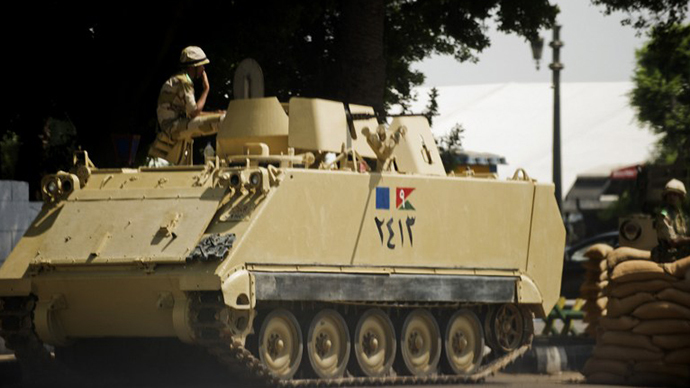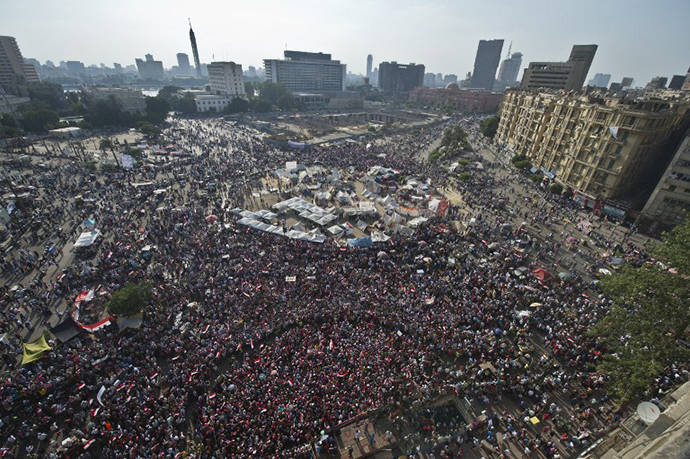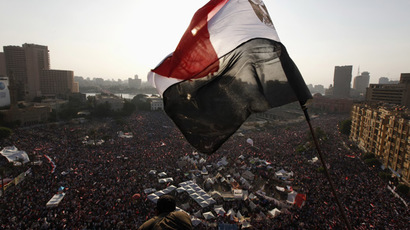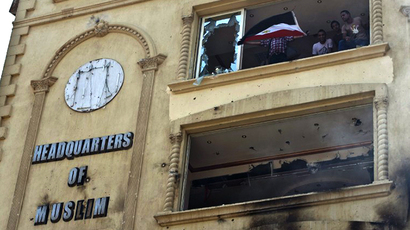Egypt's army to suspend constitution, parliament if no deal reached - sources

Egypt's army would suspend the constitution and dissolve the parliament under a draft political road-map to be pursued if President Mohamed Morsi and the liberal opposition fail to agree by Wednesday, military sources told Reuters.
Sources in the military told Reuters on Tuesday that the Supreme Council of the Armed Forces (SCAF) was still discussing the details of the draft plan and said that it could be changed based on ongoing political developments and consultations.

Sources said the army intended to install an interim council, composed mainly of civilians from different political groups as well as experienced technocrats to run Egypt until an amended constitution was drafted. This would be followed by a new presidential election, which would be delayed until strict conditions for selecting candidates were enforced.
Military sources also said that troops were preparing to deploy
on the streets of Cairo and other cities to prevent clashes
between rival political factions.
The roadmap itself was announced by the head of Egypt’s armed
forces, Chief-of-staff General Abdel Fattah El-Sisi, back on
Monday after a crisis between President Mohamed Morsi and the
liberal opposition brought millions out onto the streets in
protests.

El-Sisi announced that the army was giving politicians 48 hours to answer the demands of the Egyptian people and end the violent stand off on the streets or the military would put into action its own “road map for the future”.
Meanwhile, the political wing of the ruling Brotherhood the
Freedom and Justice Party (FJP) has called on supporters to take
to the streets to resist any move by the army to stage a coup.
As people occupied Tahir Square for a third day Bel Trew, RT’s correspondent in Cairo says the scenes are jubilant and defiant as the deadline for Morsi to meet their demands draws closer.
“If Morsi does leave and Egypt enters a situation like we saw 2 years ago after the revolution to remove Mubarak, where the country has no constitution, no parliament and no president, what the people are saying is that we don’t care, Morsi has dragged Egypt into such a dire situation, they are saying they just want to start afresh,” said Trew.

But she added the President does have a support base, “just a few kilometers from here there is an ongoing a sit in in support of Morsi by the Islamist parties including the Muslim Brotherhood’s Freedom and Justice Party who say the president was democratically elected and that he can’t be ousted from office in this manner,” she said.
A spokesman for the FJP, Murad Ali, compared the army threat of intervention to the 1952 coup by Gamal Nasser, which overthrew King Farouk and resulted in six decades of military rule.
Ali said that the people of Egypt had agreed to a constitution and that the FJP and its supporters would resist any attempt to overlook it.
“Egyptians are very aware that there are some people that are trying to push the country back in history and back to dictatorship,” he said.
“The people agreed to a constitution and this constitution draws the map,” he added.
The FJP is part of an alliance of Islamist parties that are calling on people to take to the streets to defend democracy and their right to freedom.

It took Morsi nine hours to respond to the army’s Monday announcement and he disregarded it.
“The president of the republic was not consulted about the statement issued by the armed forces. The presidency confirms it is going down its previously plotted path regardless of any statements that deepen divisions between citizens,” the response read.
After its headquarters were attacked on Monday, the Muslim Brotherhood has said it was considering action to defend itself after its national headquarters were ransacked. The army and police have said they would not defend the Brotherhood.
But despite the rhetoric of his supporters President Mohamed Morsi is looking more and more isolated, with six of his minsters resigning, the liberal opposition refusing to talk to him and the armed forces supported by millions of protesters still camped out on the streets giving him until Wednesday to share power.
They included the foreign minister, Mohemed Kamel Amr, and the cabinet spokesman. Morsi’s US trained military advisor also resigned.
A senior general told local media that if the political leaders could not agree to hold early presidential elections there could be “a return to revolutionary legitimacy.”
This would in effect mean the Islamist dominated Shura Council, the only functioning chamber of parliament, would be dissolved and the Islamist leaning constitution brought in under Morsi would be scrapped. This is largely what the opposition has been demanding.
Morsi was elected 17 months after Murbarak’s fall and has only been in office for a year, but many Egyptians are impatient with the worsening economic situation and what they see as the exclusion of non-Islamists from Egypt’s power structures.
However there are still a lot of middle class Egyptians who think that Morsi should not leave power, fearing that his ouster would create permanent political instability in the country.
“Morsi has made many mistakes, but if he leaves now only one year after he was elected, people will no longer respect the elections and any next president would not last more than a year. It will create chaos,” Alexandria-based medical student Mostafa Dowidar told RT.
“Elections must be respected - what Egypt is missing now is rules. No one respects the rules, no one respects the law.”
Although millions of Egyptians have legitimate grievances
with what they see as the government’s failings, the involvement
of the army is not a move that will help Egypt Karl Sharro, a
Middle East blogger, told RT.
“I think the opposition in agitating on the street
should have been very careful of opening up this possibility,
hundreds of thousands of Egyptians wouldn’t take to the streets
if they didn’t have legitimate grievances but ultimately if it
culminates in the army taking over, this is an aberration and a
distortion of democracy,” he said














